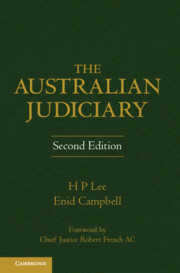Book contents
- Frontmatter
- Contents
- Preface
- Acknowledgments
- Table of Cases
- Table of Statutes
- Chapter 1 Introduction
- Chapter 2 The courts and judges
- Chapter 3 The judiciary as a branch of government
- Chapter 4 Appointment and conditions of service
- Chapter 5 Removal, suspension and discipline of judges
- Chapter 6 Judicial conduct
- Chapter 7 Extra-judicial activities of judges
- Chapter 8 Protecting judicial institutions
- Chapter 9 The accountability of judges
- Chapter 10 A public trust
- Appendix 1 Judicial statistics tables
- Guide to Judicial Conduct
- Index
- References
Chapter 1 - Introduction
Published online by Cambridge University Press: 05 December 2012
- Frontmatter
- Contents
- Preface
- Acknowledgments
- Table of Cases
- Table of Statutes
- Chapter 1 Introduction
- Chapter 2 The courts and judges
- Chapter 3 The judiciary as a branch of government
- Chapter 4 Appointment and conditions of service
- Chapter 5 Removal, suspension and discipline of judges
- Chapter 6 Judicial conduct
- Chapter 7 Extra-judicial activities of judges
- Chapter 8 Protecting judicial institutions
- Chapter 9 The accountability of judges
- Chapter 10 A public trust
- Appendix 1 Judicial statistics tables
- Guide to Judicial Conduct
- Index
- References
Summary
[T]he judiciary is the one branch of government which is an unlikely candidate as despot; despite the great powers which it is capable of exercising, especially in the area of judicial review, it remains very much at the mercy of the other arms of government.
The Rt Hon Sir Ninian StephenThe importance of the judiciary
In a democracy, constitutional government is ensured by a system of checks and balances. In his 1908 analysis of the notion of constitutional government, Dr Woodrow Wilson identified among the essential elements and institutions of a constitutional system, ‘[a] judiciary with substantial and independent powers, secure against all corrupting or perverting influences; secure, also, against the arbitrary authority of the government itself’. Dr Wilson went on to describe the courts as the ‘balance-wheel’ of a constitutional system. He described the importance of a judicial forum in the preservation of the liberty of the individual and the integrity of the government in the following terms:
There the individual may assert his rights; there the government must accept definition of its authority. There the individual may challenge the legality of governmental action and have it judged by the test of fundamental principles, and that test the government must abide; there the government can check the too aggressive self-assertion of the individual and establish its power upon lines which all can comprehend and heed. The constitutional powers of the courts constitute the ultimate safeguard alike of individual privilege and of governmental prerogative. It is in this sense that our judiciary is the balance-wheel of our entire system; it is meant to maintain that nice adjustment between individual rights and governmental powers which constitutes political liberty.
- Type
- Chapter
- Information
- The Australian Judiciary , pp. 1 - 19Publisher: Cambridge University PressPrint publication year: 2012



